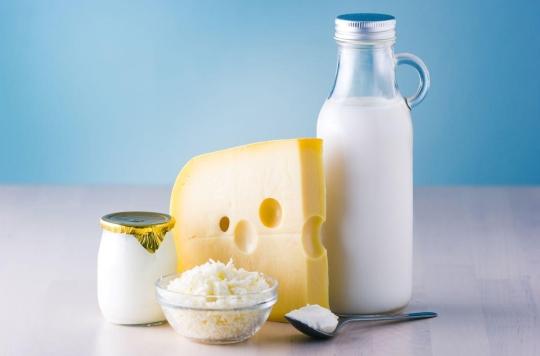Milk, cheeses, cottage cheeses and yogurts are very rich in calcium and therefore regularly recommended by specialists in the prevention of osteoporosis.

- Dairy products are very rich in calcium, especially cheese.
- Osteoporosis specialists recommend eating at least two dairy products a day.
- Calcium strengthens the bones and prevents the risk of fractures.
Osteoporosis is a natural process, most often linked to aging, characterized by a loss of bone strength, which predisposes its victims to fractures. Most often, the bones weaken due to a lack of calcium, phosphorus and other minerals. This is why specialists often recommend fill up with calcium to prevent this phenomenon. And, despite the frequent controversies surrounding dairy products, it is clear that these are very rich in calcium. “Sometimes in people’s mind, dairy products are bad for your health. It’s not based on science.assures Professor Bernard Cortet, rheumatologist at the University Hospital of Lille to Why Doctor. Beyond the extremely high calcium content of dairy products, they contain proteins and other nutrients that can exert a beneficial effect on the skeleton. »
In dairy products, however, it is necessary to distinguish between milk and fermented products: yogurts, cheeses and cottage cheeses. As a reminder, fresh cream and butter may well be made from milk, they are not counted in dairy products. These foods are high in fat but low in calcium, so you should limit your intake.
With regard to bone health, many studies have shown the benefits of dairy products and their calcium, recalls Professor Cortet, who specifies that these are cohort studies where participants who are large consumers of milk and dairy products are compared. to other people who eat less or not at all.
Prevent osteoporotic fractures
In general, this research demonstrates “a neutral effect of milk on bone health but strong benefits for heavy consumers of fermented dairy products with fracture prevention”. This applies to fractures as a whole, but some data relate more specifically to osteoporotic, hip or vertebra fractures, specifies Bernard Cortet.
And if a Scandinavian study had made a lot of noise a few years ago by showing that heavy milk consumers had a greater risk of hip fracture, it is an isolated study, assures the expert. “When we took dairy products apart from milk, there was a positive effect on bone health, and clearly on hip fracture. », he says. And to summarize: “Overall, if you take the studies as a whole, the effect of milk consumption on bone health is neutral. »
This data is all the more reassuring in that today in France, few adults still consume milk. The French mainly eat cheese, which is very rich in calcium, especially Parmesan (more than one gram per 100 grams). But Gruyère, Comté and Emmental also hold up well. Then come Reblochon, Saint-Nectaire, Bleu d’Auvergne and Roquefort, which still contain between 600 and 800 mg of calcium per 100 grams.
The same calcium intake in low-fat products
Also, if you want to strengthen your bones and don’t want to drink milk, don’t worry, you can find enough calcium in cheese. Unless you have high cholesterol and your nutritionist advises you to take it easy. In which case yoghurts and white cheeses will do just fine. Even reduced in fat, the calcium intake will remain the same (nearly 60 mg for a yoghurt). However, the taste will certainly be less tasty…
“Overall, we gladly recommend three dairy products a daysummarizes Bernard Cortet. But two could be enough because there are other sources of calcium, especially in mineral waters. » For example, a bottle of Hépar will provide you with 549 mg of calcium per L, a Courmayeur 576 mg/L and a Contrex 468 mg/L. Finally, if you suffer from lactose intolerance, in addition to mineral waters, you can fall back on foods such as broccoli, sardines, langoustines or even chia seeds and almonds, to fill up with calcium and strengthen your bones.

.















